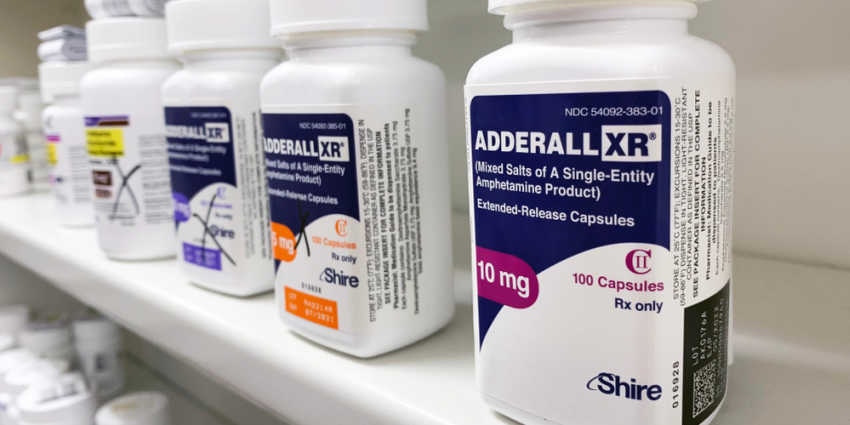Adderall is a prescribed medication used to treat severe attention deficit disorders (ADD, ADHD). However, if taken by someone who does not have an attention deficit disorder, Adderall is a massively powerful stimulant that can cause a user to become addicted after just a few uses.
What's worse, while most of America's attention is on the opioid epidemic – an epidemic that claims more than 30,000 victims annually - Adderall has quietly become one of the nation's most abused prescription medications in the world, especially among teenagers and young adults.
While Adderall can be used as an effective therapeutic strategy for severe ADD or ADHD, the highly potent stimulant has been overprescribed by doctors nationwide. The extent of the medication's over-prescribing has become such an issue; some would go as far as to say (this writer included) that Adderall has effectively turned medical physicians into illicit drug dealers. They are more interested in making a quick buck than the health of their patients.
The Origins of Adderall
Adderall has been on the market for over 20 years. Initially, the stimulant was used to treat narcolepsy, even before it became an effective treatment for attention deficit disorders. Initially, the drug was immensely impactful for narcoleptic men, women, and children, who before Adderall, had been unable to take advantage of all the things the rest of us take for granted, such as driving a car or working a traditional 9-5 occupation.
What's more, the drug also had a tremendous impact on the lives of both adults and teens who had a significant attention deficit disorder. After being prescribed Adderall, ADD/ADHD afflicted individuals experienced unprecedented alleviation of their hyperactive symptoms.
And, contrary to its usage by those who do not have ADD or ADHD, the powerful stimulant seemed like a godsend as it alleviated ADD symptoms in afflicted individuals while delivering little no adverse side effects to said ADD/ADHD patients.
However, much like today's opioid crisis, it wasn't long before the highly addictive medication found its way to drug culture's zeitgeist. Due to its stimulating effect on those who don't have attention deficit disorder, the drug became one of the most overprescribed medications within the first ten years of its inception.
In other words, it wasn't long before Adderall's illicitly stimulating popularity spread far beyond its initial noble intentions and far beyond the reach of those it treats.
The Epidemic Abuse of Adderall in Today's Teenage Culture
Rather than using it for its original purposes (to alleviate ADHD related symptoms), millions of young people use Adderall as a study aid. While abusing Adderall, teens can remain over stimulated and alert for extended periods of time - even days on end. 
While once mainly associated with that of college students, teens in high school are quickly becoming equally addicted to Adderall and its stimulating, academic-boosting effects. In 2009, it was estimated that roughly 5% of high schoolers were regularly abusing the drug for 'non-medical reasons.' That number rose 7% in 2013, and as of 2019, is believed to be somewhere near 10% of high school students.
Needless to say, regardless of its original intent, Adderall is addictive.
So, Why is Adderall So Addictive?
Due to its stimulating qualities, Adderall is highly common among high school and college students who use it to enhance their studying and extracurricular performances, including non-educational pursuits such as athletics.
Pretty much from the first use, users of the drug become immediately dependent on the drug's stimulating effects. The near-instant dependency effects of Adderall are so drastic that even first time users typically suffer from significant withdrawal symptoms, including depression and extreme fatigue, after immediately discontinuing their usage.
While classified as a clinical, prescribed medication, many experts agree that, if severely abused, "Adderall can essentially become a legalized version of illicit methamphetamine" - the street drug with a reputation of being the most addictive in existence.
It's safe to say Adderall abuse has well surpassed what qualifies as a national crisis.
As one David Baron, a Yellowbrick medical director Chicago Med School professor surmises,
"Adderall is probably both overprescribed — for those who report trouble concentrating and don't have ADHD — and under-prescribed, for the many people whose symptoms of ADHD are either unrecognized or unreported."
What Can Be Done to Curb The Nation's Youth From Abusing Such a Harmful, Addictive Substance?
As Baron proposes adapting the way with which we currently diagnose ADHD, "As the tools for diagnosing ADHD becomes more sophisticated, it may be easier to determine who will benefit from taking Adderall. This would mean fewer prescriptions obtained by fraudulent means, and more importantly, less Adderall sold illegally on school grounds."
The Doctor adds, "The psychiatric profession and primary-care physicians have increasing opportunities to become more adept at differentiating actual indications for Adderall and other stimulant medications, which may increase their appropriate use."
Unfortunately, today's culture, medical professionals, and even academic systems have failed today's youth.
For instance, teens are overworked and pressured to perform academically more than ever. This unprecedented drive to achieve has created an insatiable market for Adderall - one which too many of the nation's doctors are too zealous to provide.
Incidentally, experts like Baron suggest, in addition to modifying our diagnoses of ADHD, we teach more effective and efficient ways in which to study Eg., keeping workloads more manageable, and setting more reasonable expectations for our teenage students.
After all, if it can prevent high schoolers from abusing a drug that is essentially the equivalent of the most addictive illicit street drug known to man, it's certainly worth a try.
